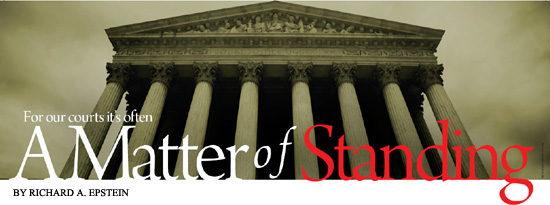A Matter of Standing
Richard A. Epstein
A sharply divided Supreme Court in Hein v. Freedom From Religion Foundation held that President Bush's faith-based initiatives could not be challenged in federal court as a prohibited state establishment of religion. Hein said nothing about the merits of the underlying challenge, but relied instead on the constitutional rule that denies taxpayers "standing" to sue.
Many liberals criticized the decision because it erodes the line between church and state. Many conservatives have hailed the decision for the opposite reason. I think the liberals have a point on the merits—but quite apart from the merits, conservatives who cheer Hein make a critical mistake. Any defender of limited government who believes in an originalist interpretation of the Constitution should reject, root and branch, the Court's hostility to taxpayer standing.
"Standing" doctrine holds that only certain individuals are in position to challenge the constitutionality of various government actions. Today's basic rule allows challenges only from parties with a distinct "pocketbook interest," such as personal injury or contract loss. That rule blocks taxpayers from suing to stop action that they claim lies outside congressional or executive power.
The doctrine arose from two companion suits brought in 1923 against Andrew Mellon, then secretary of the treasury, to block the collection and expenditure of funds under the 1921 Maternity Act, which offered to cooperating states federal grants intended to reduce infant and maternal mortality. Any state could opt out of the grant—but its citizens could not opt out from the taxes needed to fund it. Massachusetts and Mrs. Frothingham sought to stop a program they claimed was exclusively of local concern under the Tenth Amendment, which reserves powers not delegated to the federal government to the states. Justice Sutherland, writing for a unanimous court, ducked the substantive issue by denying standing to both plaintiffs.
Since then, the one major exception to the standing doctrine surfaced in 1968 in Flast v. Cohen, which did allow taxpayers an establishment clause challenge to the payment of federal funds to religious schools. Hein asked whether the Flast exception allowed taxpayers to challenge discretionary executive branch expenditures in support of faith-based initiatives. The upshot was a three-way split. Justice Alito, writing for the chief justice and Justice Kennedy, held the Flast exception did not. Justices Scalia and Thomas wanted to deny taxpayer standing across the board, overruling Flast. That uneasy coalition tossed the foundation out of court. Justice Souter, speaking for Justices Stevens, Ginsburg, and Breyer, argued that Flast governed.
Taxpayers Have Every Right to Challenge Unconstitutional Government
They all addressed the wrong question: the proper rule should allow all taxpayers free rein to challenge either Congress or the executive branch for overstepping their constitutional authority.
At stake is whether judicial review itself remains as a check on the political branches. Blocking taxpayer standing often leaves no one to challenge congressional or presidential actions as inconsistent with our basic constitutional design—allowing both branches to act in areas where they have no constitutional authority.
Many conservatives might react in horror: high-flying legal theory should never be invoked to manufacture new powers for the federal courts. But limits on taxpayer standing do not derive from any textual command. They rest on a serious misreading of the constitutional text, which contains no standing requirement at all.
Article III states that "the judicial power [of the federal courts] shall extend to all cases, in law and equity." Therefore follows a discrete list of various disputes over which that power shall be exercised: suits arising under the Constitution and federal laws, suits to which the U.S. is a party, and the like. Nothing about this limits who counts as a proper plaintiff. It is therefore a supreme sleight of hand to assume that Article III justifies this self-imposed limit on judicial power.
Quite the opposite. The pocketbook or discrete injury requirement of standing is rightly implied for cases "in law"—that is, the old common-law courts—where only damages could be awarded. But from well before even the federal constitution unified state and federal courts, courts could use their powers of equity to issue injunctions to stop the illegal actions, or local governments at the instance of shareholders, members, or taxpayers.
Justice Scalia therefore takes a blatantly antioriginalist position by reading into the Constitution a limitation found neither in its text nor its basic structure, nor in the general judicial practice running deep in our history. Hein does not involve a question, as he says, of "mental displeasure" on the part of members of the Freedom From Religion Foundation. The question is about the structural integrity of our government under the Constitution. It is not Flast that needs to be overturned, but Frothingham v. Mellon.
There are high stakes here in the ongoing debate between majoritarians and limited government libertarians. Majoritarians may think that our Consti_tution is simply a blueprint to organize democratic politics. But its elaborate system of separation of powers, checks and balances, and individual guarantees reveals a far more complex structure.
These issues have and will replay themselves in areas from national security to environmental protection, where federal legislation and executive initiatives could raise serious constitutional questions. When they do, our commitment to limited government calls for a full and substantive analysis, not an artful dodge by unprincipled procedural tricks.
Richard A. Epstein is a professor of law at the University of Chicago and a senior
fellow at the Hoover Institution.